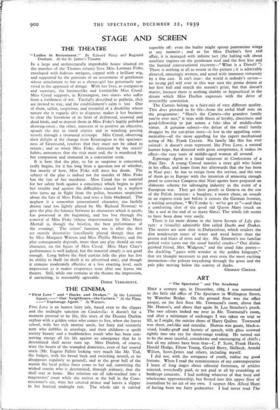STAGE AND SCREEN
THE THEATRE
" Ladies in Retirement." By Edward Percy and Reginald Denham. At the St. James's Theatre.
IN a large and architecturally improbable house situated on the marshes of the Thames estuary lives Miss Leonora Fiske, enveloped with hideous antiques, capped with a brilliant wig, and supported by the pensions of an assortment of gentlemen whose attachment to her as a chorus-girl has generously sur- vived to the approach of dotage. With her lives, as companion and secretary, the businesslike and formidable Miss Creed. Miss Creed supports, in Kennington, two sisters who suffer from a feebleness of wit. Tactfully described as pathetic, they are invited to stay, and the establishment's calm is lost One of them, sullen, suspicious, and resentful of a disability whose nature she is vaguely ab!e to diagnose, makes it her business to clear the foreshore of its litter of driftwood, seaweed and dead birds, and to deposit them in Miss Fiske's highly polished drawing-room ; the other, innocent of so positive an objective, spends the day in timid chatter and in watching passing vessels through a treasured te:escope. Miss Creed, observing their delight at the change from Kennington to the spacious- ness of Gravesend, resolves that they must not be asked to return ; and so when Miss Fiske, distracted by the sisters' habits, announces that the visit must end, she is murdered by her companion and immured in a convenient oven.
It is here that the play, so far as suspense is concerned, really begins, for it has long been a question not of whether, but merely of how, Miss Fiske will meet her doom. The subject of the play is indeed not the murder of Miss Fiske but the fate of her murderer. Miss Creed has to contend for her safety both against a conscience which begins to give her trouble and against the difficulties caused by a nephew who turns up in flight from the police, becomes suspicious about the fate of Miss Fiske, and tries a little blackmail. The nephew is a somewhat conventional character, too facilely drawn (and too lightly played by Mr. Richard Newton) to give the play the balance between its characters which it needs, has possessed at the beginning, and has lost through the removal of Miss Fiske (whose impersonation by Miss Mary Merrall is, though the briefest, the best performance of the evening). The sisters' function too is after the first act merely decorative (excellently played though they are by Miss Margaret Watson and Miss Phyllis Morris), and the play consequently depends, more than any play should on one character, on the figure of Miss Creed. Miss Mary Clare's performance is well judged, but the material simply is not good enough. Long before the final curtain falls the play has lost its ability to thrill (to thrill is its advertised aim), and though it remains moderately effective at a less exacting level, such impression as it makes evaporates soon after one leaves the theatre. Still, while one remains in the theatre the impression, if unexciting, is reasonably agreeable.
DEREK VERSCHOYLE.




































 Previous page
Previous page